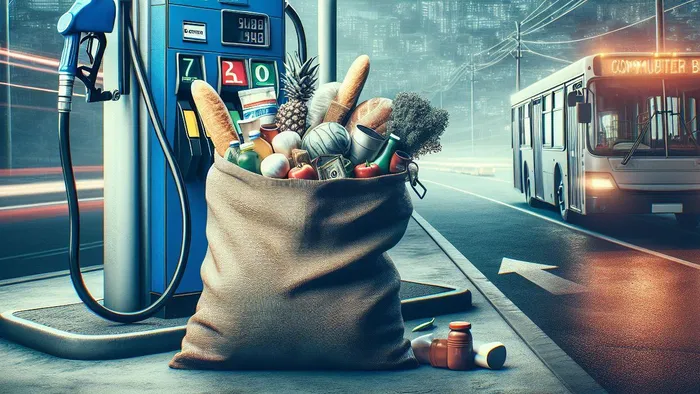The poor will be hit hardest: Treasury slammed for increasing fuel levy in 2025 Budget 3.0

Fuel prices have a direct impact on the cost of goods and services.
Image: RON AI
South Africans might have escaped the dreaded one percent Value Added Tax hike proposed in the original Budget, but fuel taxes are now set to rise from the beginning of June.
In his revised 2025 Budget proposal, announced on Wednesday, Finance Minister Enoch Godongwana announced that the General Fuel Levy (GFL) would increase by 16 cents for petrol and 15 cents for diesel.
Although the modest fuel price decrease forecast for June, due to the current price over-recovery, is likely to cancel out the petrol levy increase, the effects of the tax hike will be felt further down the line when international oil prices inevitably rise again.
Following the fuel tax hike, which takes effect in June, the GFL will now total R4.01 per litre for petrol and R3.85 for diesel. The total tax on petrol, once the RAF levy and carbon taxes are factored in, will amount to R6.37 per litre.
This is likely to push the tax on petrol beyond 30%, depending on June’s final price calculations, which have yet to be announced.
ALSO READ: How South Africa's fuel taxes affect daily life
Organisations such as the Automobile Association (AA) and Road Freight Association (RFA) have slammed the decision by Treasury to raise fuel taxes.
“This levy adjustment comes at a time when South Africans are already contending with high food prices, elevated interest rates, increased electricity tariffs and persistently high unemployment,” said Eleanor Mavimbela, spokesperson for the AA.
“Fuel is a critical input cost across all sectors of the economy; any increase inevitably drives up transport and operational costs, further intensifying inflation.
“Lower-income households, which spend a greater share of their income on transport, will be disproportionately affected by this rise,” Mavimbela added.
Gavin Kelly, CEO of the RFA, said the fuel levy increase would be felt directly by consumers as transporters cannot absorb the increase without detrimental effects on their bottom line.
This will see global supply chains re-evaluate their routes, while the consumer will ultimately pay more for goods and services.
“Treasury would rather tax citizens than cut the wasteful expenditure that has brought the country to where it is,” Kelly said.
“Government does not have money - it belongs to the taxpayers, and the time for accountability and responsibility has come.”
Full transparency needed
The AA added that while it recognises the need to address fiscal pressures, continuously using fuel levies to fill budget gaps is unsustainable for the country, particularly in the absence of true transparency on how these funds are allocated and used.
The organisation has called for a forensic audit of revenue generated from the fuel levies, and the price-setting formulas in place for fuel, as well as an exploration of alternative funding mechanisms that reduce reliance on fuel-based taxation.
Get your news on the go, click here to join the IOL News WhatsApp channel
IOL
Related Topics:
